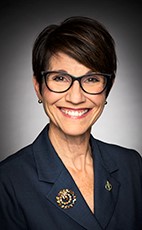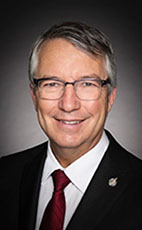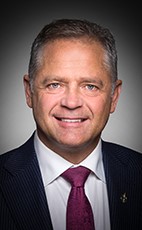Briefing binder created for the Deputy Minister of Finance on the occasion of his appearance before the House of Commons Standing Committee on Public Accounts on March 9, 2021 on the study: Public Accounts of Canada 2020
(Briefing with the Deputy Minister of Finance)
Tuesday, March 3, 2021
12:00PM – 1:00PM
Table of Contents
Summary Reports:
- November 17, 2020
Study: Report 3, Taxation of E-Commerce, of the 2019 Spring Reports - December 3, 2020
Study: Report 3, Taxation of E-Commerce, of the 2019 Spring Reports - January 26, 2021
Study: Public Accounts of Canada 2020
Committee Follow-Ups:
- Response 1: GST/HST on cross-border digital products and services
Response 2: Estimate of GST revenue on foreign digital products and services sold in Canada in 2017 (see supplemental, Tab 7)
Requested November 17, 2020
Submitted December 2, 2020 - Response: GST/HST on goods purchased from non-resident vendors
Requested December 3, 2020
Submitted January 26, 2021 - Response: Pricing carbon pollution
Requested January 26, 2021
Submitted February 16, 2021 - Supplemental Response: Estimate of GST revenue on foreign digital products and services sold in Canada in 2017
Requested February 2, 2021
Submitted February 5, 2021 - Committee Overview
Report on Standing Committee Meeting
Name of Committee: Standing Committee on Public Accounts (PACP)
Date and time: November 17, 2020 (11:00 AM – 1:00 PM)
Subject: Report 3, Taxation of E-Commerce, of the 2019 Spring Reports of the Auditor General of Canada
Report Prepared by Roxane Sabourin – Parliamentary Analyst
*redacted*
Note that this report is provided for information purposes only and should not be quoted.
Witnesses / Témoins
Office of the Auditor General :
- Karen Hogan, Auditor General of Canada
- Mathieu Lequain, Director
- Philippe Le Goff, Principal
Canada Border Services Agency :
- John Ossowski, President
- Peter Hill, Vice-President, Commercial and Trade Branch
Canada Revenue Agency :
- Bob Hamilton, Commissioner of Revenue and Chief Executive Officer
- Ted Gallivan, Assistant Commissioner, Compliance Programs Branch
Department of Finance :
- Paul Rochon, Deputy Minister
- Andrew Marsland, Senior Assistant Deputy Minister, Tax Policy Branch
Summary / Sommaire
The Standing Committee on Public Accounts (PACP) met in order to discuss the report of the Auditor General of Canada on the taxation of e-commerce. Witnesses from the Office of the Auditor General, the Canada Border Services Agency, the Canada Revenue Agency and the Department of Finance first explained the context of the report, highlighting the rise in e-commerce, inequities between Canadian and foreign sellers as well as actions they undertook to remedy some of the issues. Members of the Committee then asked for precisions on different issues, such as the need for legislative action, the methodology used to calculate the tax gap for e-commerce, the impact additional taxes would have on Canadians and the responsibility of each institution in regards to e-commerce taxation. This report will concentrate on questions and issues related to the Department of Finance.
Mr. Paul Rochon, Deputy Minister for the Department of Finance, and Mr. Andrew Marsland, Senior Assistant Deputy Minister at the Tax Policy Branch of the Department of Finance, appeared before the Committee to answer some of their questions. Mr. Rochon made an opening statement explaining Finance was monitoring the evolution of e-commerce in Canada and what its rapid growth could mean for our tax system, while working with international partners to make sure our tax system continues to function effectively as the digital economy gains in importance.
Mr. Philip Lawrence (CPC) was concerned that taxation of digital giants would come out of the pocket of Canadians and would disproportionally affect lower income Canadians. Mr. Rochon explained that while taxes would normally be expected to be absorbed in the margins of the corporation in a competitive market, it could be passed on the consumer if the corporation has the ability to adjust prices. A commitment was made to get back to the Committee with more information on how this could disproportionally affect lower income sections of the population. This line of questioning was furthered when Mr. Lawrence asked why the government could not remove GST for Canadian digital providers instead of trying to taw foreign digital providers. Mr. Rochon talked about relative rates of taxation to answer this question. Mr. Lawrence also asked if taxing foreign companies could influence reciprocal actions by trading partners. Mr. Rochon made the distinction between sale taxes, which would not be a major concern, and the larger debate on income taxation of foreign companies, which would be another topic.
Mr. Maxime Blanchette-Joncas (BQ) was concerned about the legislation needed to adapt the taxation system to current challenges. Mr. Rochon explained that while the Department of Finance provided advice to the Government, the decision of how and where to tax was fundamentally a policy decision and that he was not in a position to comment on the legislative aspect of this question. A commitment was made to provide the Department’s estimate of losses incurred from tax not collected on the digital selling of goods and services by foreign vendors.
Mr. Matthew Green (NDP) was also concerned about the legislative aspect of this question, asking when the legislation was last reviewed and whether he had discussed this with the Minister of Finance. Mr. Rochon clarified that while the problem is e-commerce transactions coming from abroad, the vast majority of e-commerce transactions in Canada are already subject to the GST. He explained that while he could not comment on the legislative aspects, conversations on this issue had taken place in the department since 2014.
Follow-up Items / Suivis
Parliamentary Affairs will review the unedited transcript when made available, identify follow-ups and task the appropriate sector(s) accordingly.
Report on Standing Committee Meeting
Name of Committee: Standing Committee on Public Accounts (PACP)
Date and time: December 3, 2020 (11:00 a.m. – 12:30 p.m.)
Subject: Report 3, Taxation of E-Commerce, of the 2019 Spring Reports of the Auditor General of Canada
Report Prepared by Colin Archer, Senior Analyst
*redacted*
Note that this report is provided for information purposes only and should not be quoted.
Note: this report focuses primarily on exchanges between members and Finance officials.
Witnesses / Témoins
Office of the Auditor General
- Karen Hogan, Auditor General of Canada
- Mathieu Lequain, Director
- Philippe Le Goff, Principal
Canada Border Services Agency
- John Ossowski, President
- Peter Hill, Vice-President, Commercial and Trade Branch
Canada Revenue Agency
- Bob Hamilton, Commissioner of Revenue and Chief Executive Officer
- Ted Gallivan, Assistant Commissioner, Compliance Programs Branch
Department of Finance
- Paul Rochon, Deputy Minister
- Andrew Marsland, Senior Assistant Deputy Minister, Tax Policy Branch
Summary / Sommaire
The Standing Committee on Public Accounts (PACP) met in order to continue discussions from its November 17, 2020 meeting on the report of the Auditor General of Canada on the taxation of e-commerce. A number of topics were discussed during the meeting, including: the need for legislative action, the methodology used to calculate the tax gap for e-commerce, the impact additional taxes would have on Canadians and the responsibility of each institution in regards to e-commerce taxation.
In his opening statement, Mr. Paul Rochon explained Finance was monitoring the evolution of e-commerce in Canada and what its rapid growth could mean for the tax system, while working with international partners to make sure Canada’s tax system continues to function effectively as the digital economy gains in importance.
Mr. Philip Lawrence (CPC) asked the Office of the Auditor General whether they had received the funding they had requested in the Fall Economic Statement. The Auditor General stated that they were pleased that their request was addressed in the Fall Economic Statement as it provides them with the clarity they need to move forward. Addressing the Department of Finance, it was asked whether the taxation of digital services would lead an increased tax load on Canadians. Officials estimated the uptake will be $396 million in 2021/22 and $583 in 2022/23. In response to whether the GST rebate was being increased, it was noted there are no plans to increase it at this time and that it is indexed to inflation.
Mr. Maxime Blanchette-Joncas (BQ) asked whether it could be said that Canada will recoup billions of dollars as a result of newly announced measures. Finance officials replied that the measures announced in the Fall Economic Statement provide a structure which addresses issues relating to e-commerce. In terms of recouping taxes from air bnb’s and digital services, officials were asked to explain why the federal government was behind Quebec in this area. Officials noted such questions should be directed at a minister (i.e., the question relates to policy direction/decisions which rests with ministers). Mr. Blanchette-Joncas asked if it would be correct to say that when jobs are lost by local business, there is less money in the state coffers, which either leads to the Government cutting services or raising taxes. It was also asked why nothing had been done in the past to resolve issues of fiscal equity. It was noted by officials that an in-depth analysis was needed, that developments needed to be followed and discussions held.
Mr. Luc Berthold (CPC) asked whether there was an analysis showing the percentage of goods stored in Canada as opposed to that coming directly from large providers, and the resulting revenue loss. Officials stated that while tax is paid at the border on the customs declared value, they are technically a sale by a non-resident fulfilled in Canada and this proposal will ensure tax is applied to the final retail price. Mr. Berthold requested a written response addressing this issue in a general sense. (Follow-up)
Mr. Kody Blois (LPC) expressed interest in the legislative changes which will be needed to move these proposals forward. Finance officials stated that in the Fall Economic Statement a draft legislative proposal was released, which aims to receive comments from interested parties. Further questions focused on how the proposals work with existing trade agreements. Officials noted there is no direct relationship, but that indirectly there has been a growth in the business model where sales are completed through a warehouse in Canada.
Ms. Jean Yip (LPC) asked whether measures in the Fall Economic Statement which require foreign based venders selling digital products or services to Canadians, register for, collect and remit the GST, brings Canada in line with OECD recommendations on digital economy. The Auditor General stated that the measure is in line with the OECD’s recommendations.
Mr. Alexandre Boulerice (NDP) asked what will be done to charge taxes when residences are used as hotels and not as residents. Officials from the Department of Finance replied that where accommodation is let through a digital platform, the GST and HST will be collected in all cases, and that the proposal aims to ensure that there is an effective collection of sales tax. Questions dealing with the Fall Economic Statement focused on how web giants will be taxed and how digital broadcasters will be handled. Finance officials stated that the OECD framework is the one the Government proposes to follow, noting that it has been applied in other jurisdictions with high compliance. In response to questions on whether there been any providers in Quebec or Canada which have left the country in order to benefit from a physical advantage by not having to pay Canadian sales tax, Finance officials noted that they were not aware of specific examples. Interest was expressed in the consequences of fiscal measures which are not harmonized with consumer purchasing habits. Officials stated that there is a risk to having no harmonization and that it results in a “leakage of taxes” which should be payable.
Follow-up Items / Suivis
Parliamentary Affairs will review the unedited transcript when made available, identify follow-ups undertaken by Finance officials, and task the appropriate sector(s) accordingly.
Report on Standing Committee Meeting
Name of Committee: Standing Committee on Public Accounts (PACP)
Date and time: January 26, 2021 (11:00 a.m. – 1:00 p.m.)
Subject: Public Accounts of Canada 2020
Report Prepared by Emily Howe, Parliamentary Assistant
*redacted*
Note that this report is provided for information purposes only and should not be quoted.
Note: this report focuses primarily on exchanges between members and Finance officials.
Members in Attendance / Membres présents
- Ms. Kelly Block, Chair (CPC)
- Mr. Len Webber (CPC)
- Mr. Lloyd Longfield, Vice-Chair (LPC)
- Mr. Maxime Blanchette-Joncas, Vice-Chair (BQ)
- Mr. Francesco Sorbara (LPC)
- Mr. Philip Lawrence (CPC)
- Mr. Kenny Chiu (CPC)
- Mr. Kody Blois (LPC)
- Mr. Matthew Green (NDP)
- Ms. Iqra Khalid (LPC)
Witnesses / Témoins
Office of the Auditor General
- Karen Hogan, Auditor General of Canada
- Chantale Perreault, Principal
- Étienne Matte, Principal
Department of Finance
- Michael J. Sabia, Deputy Minister
- Nicholas Leswick, Assistant Deputy Minister, Economic and Fiscal Policy Branch
- Darlene Bess, Chief Financial Officer, Financial Management Directorate, Corporate Services Branch
Treasury Board Secretariat
- Roch Huppé, Comptroller General of Canada
- Roger Ermuth, Assistant Comptroller General, Financial Management Sector, Office of the Comptroller General
- Diane Peressini, Executive Director, Government Accounting Policy and Reporting, Office of the Comptroller General
Summary / Sommaire
The Standing Committee on Public Accounts (PACP) met in order to study the Public Accounts of Canada 2020. A number of topics were discussed during the meeting, including: the impact of COVID-19 on the Office of the Auditor General of Canada (OAG), digitization and data access, the overstatement of national defense expenses, the Phoenix Pay System, Carbon Pricing, compensation to First Nations, the Department of Finance spending, and details of Canada’s deficit, revenues, and expenses.
Mr. Lloyd Longfield (LPC) inquired about losses of public property compared to other years. TBS officials responded that this amount varies and there is no accurate trend in these losses. The Member then shifted to address the Department of Finance Deputy Minister and asked for clarity regarding fuel charge proceeds and a discrepancy in revenues. Finance officials confirmed that there is a small discrepancy in revenues, but noted every dollar collected in this program will be returned to Canadians.
Mr. Maxime Blancette-Joncas (BQ) followed a pointed line of questioning on the problems associated with the Phoenix Pay System and asked about the timeline of a resolution and whether the Auditor General was satisfied with this system. Ms. Hogan responded that things are improving, but this requires further collaboration and it is up to the Government to correct this. The Member continued this questioning when addressing Mr. Huppé, who responded that his enthusiasm connected to the work of Public Servants and their efforts during this crisis. Mr. Blanchette-Joncas then asked about reserves on audits. Mr. Huppé noted that the United States and other G7 countries have reserves on audits, and Canada is the only country to have a clean opinion for 22 years. The Member then addressed Mr. Sabia’s career and commitment to his work, asking whether this new role in the Government is more restrictive and whether Mr. Sabia can address Phoenix concerns. Mr. Sabia noted that there is an opportunity to use creativity to get the economy growing, but could not answer directly on pay concerns.
Mr. Philip Lawrence (CPC) asked about whether Carbon Pricing is revenue neutral. Mr. Leswick noted that revenues go directly back to households through the program, not the government of origin. The Member also inquired about GST and HST, and whether this was applied to Carbon Pricing at an individual level. Mr. Leswick suggested to take this question back to confirm. Mr. Lawrence then inquired about the assessment of the Department of Finance spending. Mr. Sabia responded that the department believes it had authority for those payments and did not fully share the OAG conclusions. The DM noted that Finance is looking at the best way to regulate this based on comments from the OAG. Mr. Lawrence asked the Auditor General to confirm her stance on this issue, wherein the Auditor General stated that her original comments stand, but the Department of Finance’s actions that followed satisfied her concerns. Mr. Lawrence then asked about the deficit and the slowing of the economy. Mr. Leswick responded that COVID-related impacts are difficult to calculate and that revenues had two major shocks due to the shutdown, as well as Government programs. Mr. Lawrence sought confirmation about decreasing revenues and increasing expenses. Mr. Leswick referred to the 2019 forecast that examined the increasing deficit. Mr. Lawrence asked if growth is one of the best ways to pay off debt, to which Mr. Sabia confirmed it is fundamental.
Mr. Francesco Sorbara (LPC) asked about the increase of personnel costs in the private sector. Mr. Huppé responded that these expenditure increases are connected to wages. The Member then asked Mr. Sabia about digitization and other initiatives. Mr. Sabia responded that digitization is important to develop across every sector, particularly small businesses, which it was noted are the backbone of our economy.
Mr. Matthew Green (NDP) inquired about a settlement claim to an aerospace company and the circumstances on a $5 million payment. Finance officials noted that this question will be taken back. Mr. Green then continued Mr. Lawrence’s line of question on payments to the provinces, asking whether these payments required TBS approval. Mr. Huppé noted that the Department of Finance had done their due diligence and as the payment came from Finance, it did not need the approval of the TBS President. This line of questioning continued with Mr. Kenny Chiu (CPC), where Ms. Hogan noted the resolution of these payments being included in the Supplementary Estimates.
Mr. Kody Blois (LPC) asked about the Government debt-GDP ratio and details in relation to provinces. Mr. Leswick noted that there is a reconciliation of Canada’s debt in a national context in order to put G7 countries on a comparable basis, which requires Canada to put all levels of governments together and make adjustments. Mr. Blois then inquired about GDP growth estimates and whether this remains an accurate forecast. Mr. Sabia noted that there is uncertainty and it is difficult to make specific estimates on growth, but stated that there was a downturn and resurgence of growth, and what is being seen in Canada and globally is the result of lockdown activities, which will lead to lower growth.
Follow-up Items / Suivis
Parliamentary Affairs will review the unedited transcript when made available, identify follow-ups undertaken by Finance officials, and task the appropriate sector(s) accordingly.
Finance Canada Response to Committee Undertaking
November 17, 2020 Appearance before the Standing Committee on Public Accounts on the issue of “Report 3, Taxation of E-Commerce, of the 2019 Spring
Reports of the Auditor General of Canada”
Question 1:
Mr. Philip Lawrence: Yes.
As sales taxes, generally they are regressive in nature and that they have a greater impact on those with lower incomes. So if in fact we impose a tax or change the legislation for direct remittance of this, it would disproportionately affect the lower and middle classes, is that not correct?
The Chair: A very short question, Mr. Rochon.
Mr. Paul Rochon: Yes. I need to look at that specifically. Of course, we have the GST Low Income Credit to deal specifically with that issue of the incidence of the GST [Inaudible] Canadians.
The Chair: Thank you very much.
Response:
The imposition of the GST/HST on cross-border digital products and services would affect households differently, depending on where they live and which digital products and services they buy. For example, some households may not purchase any streaming services at all, or may only purchase Canadian-based streaming services. Others may subscribe to several non-resident based services.
As part of the Fall Economic Statement tabled on November 30, 2020, the government proposed that foreign-based vendors selling digital products or services to consumers in Canada be required to register for, collect and remit the GST/HST on their taxable sales to Canadian consumers, effective July 1, 2021.
At a very high level, we estimate that applying the 5% federal portion of the GST/HST to digital goods and services purchased from non-resident vendors will raise some $243 million the first full year of application, in 2022-23. With about 15 million households in Canada, this translates into an incremental federal GST cost of about $16 per household in that year.
There are no regularly published data on the consumption of digital goods and services by income group. The most recent study we are aware of was published by Statistics Canada (Digital Economy, released August 29, 2018).
- In the case of music downloads and streaming services, Statistics Canada reports that the annual average spending in 2018 was $94 for individuals with income less than $40,000 and $156 for those with income greater than $100,000. If all of this spending were subject to the 5% federal portion of the GST/HST, then it would result in an additional annual cost of about $4.70 for lower income individuals and $7.80 for higher income individuals.
- In the case of video downloads and streaming services, Statistics Canada reports that the annual average spending in 2018 was $136 for individuals with income less than $40,000 and $193 for those with income greater than $100,000. If all of this spending were subject to the 5% federal portion of the GST/HST, then it would result in an additional annual cost of about $6.80 for lower income individuals and $9.70 for higher income individuals.
Some Canadians may be more affected by the proposal than others given their lower ability to pay taxes. For low- and modest-income Canadians, the GST Credit provides about $5 billion in annual assistance to help offset the federal sales tax burden they may face. For example, a low-income family of four would receive a GST Credit of up to about $900 annually. This would cover the federal 5% GST on the purchase of up to $18,000 of GST/HST taxable goods and services.
Question 2:
Mr. Maxime Blanchette-Joncas: Thank you, Madam Chair.
My question is for Mr. Rochon, the deputy minister of finance.
According to the Office of the Auditor General, the federal government lost $169 million in GST revenue on foreign digital products and services sold in Canada in 2017. The report also indicates that you calculated the lost sales tax revenue but didn't report it publicly. Can you tell us what Finance Canada’s loss estimate was?
Mr. Paul Rochon: I'm going to ask my colleague Mr. Marsland to answer that question. Mr. Andrew Marsland (Senior Assistant Deputy Minister, Tax Policy Branch, Department of Finance): Thank you. Like any estimate, it depends somewhat on the definition of what you're dealing with. The Auditor General did mention a figure in her opening remarks. My sense is that this is roughly about the GST at play in relation to the digital services that we're discussing today.
Mr. Maxime Blanchette-Joncas: Did you estimate the losses that might have caused? Mr. Andrew Marsland: I would have to get back to the committee with a specific figure.
Mr. Maxime Blanchette-Joncas: Thank you.
Response:
As part of the Fall Economic Statement tabled on November 30, 2020, the government proposed that foreign-based vendors selling digital products or services to consumers in Canada be required to register for, collect and remit the GST/HST on their taxable sales to Canadian consumers, effective July 1, 2021.
We estimate that applying the 5% federal GST to digital goods and services purchased from non-resident vendors would have the projected federal revenue impact set out in the following table.
| 2021 | 2022 | 2023 | 2024 | 2025 | 2026 | Total |
|---|---|---|---|---|---|---|
| – | 166 | 243 | 257 | 267 | 282 | 1,215 |
| Note: A "–" indicates an amount less than $500,000. Assumed coming into force date of July 1, 2021. | ||||||
Finance Canada Response to Committee Undertaking
December 3, 2020 Appearance before the Standing Committee on Public Accounts on the issue of “Taxation of E-Commerce, of the 2019 Spring Reports of the Auditor General of Canada”
Topic / Question:
M. Luc Berthold: Mr. Rochon, in the economic statement we were given this week, there were proposals about taxing products. However, you made a distinction between products stored in Canada by the web giants and those that are not.
Have you done an analysis of the current percentage of products warehoused in Canada and those that are sent directly from these major suppliers without going through Canadian fulfilment warehouses? How many assessments of foregone revenue have been done?
My daughter and I—shame on her and just a bit on me—still order products on the Internet and still receive parcels directly from China without paying any tax. I may end up being one of the first targets of the Canada Revenue Agency, but I'm just using this as an example to illustrate my point.
Have you conducted any studies that could give us a better overview of the situation?
Response:
Non-resident vendors may sell goods to Canadians and ship these goods by mail or courier from outside of Canada directly to purchasers in Canada. These goods may be sold by non-resident vendors through digital platforms, also known as online marketplaces, or by non-resident vendors through their own websites.
With respect to such sales, the Canada Border Services Agency (CBSA) is responsible for assessing applicable duties and taxes on the goods when they are imported into Canada, including when imported through the postal and courier streams. The CBSA is also responsible for administering the Courier Low Value Shipments Program, which provides for streamlined reporting, release and accounting procedures for certain goods that are transported by courier.
- The CBSA is responsible for accounting for goods imported into Canada. According to the CBSA, $9.2 billion of goods were imported through the courier stream in 2019-20. These courier imports include commercial goods, as well as goods sold to consumers. The Department of Finance Canada is not aware of any data on the value of goods shipped from outside Canada directly to consumers in Canada.
Non-resident vendors may also sell goods to Canadians through fulfillment warehouses in Canada. These are warehouses that non-resident vendors use to store goods in Canada and make deliveries to Canadians in a timely way.
In the case of such goods, applicable duties and taxes are levied and collected by the CBSA at the border on the value of the goods that are imported into Canada for the purpose of being stored in fulfillment warehouses and subsequently sold to Canadians. Although these goods are situated in Canada at the time of sale, there is generally no requirement under the current Goods and Services Tax/Harmonized Sales Tax (GST/HST) rules for the non-resident vendor, or digital platform facilitating the sale, to collect or remit the GST/HST when the goods are subsequently sold to purchasers in Canada. This means that the difference between the value of the goods at the time of importation and the final price paid escapes the GST/HST.
- The Department of Finance Canada estimates that the value of goods sold by non-residents through fulfillment warehouses in Canada was about $3.0 billion in 2019-20.
To help ensure greater fairness in the tax system, the Government of Canada proposes to apply the GST/HST on all sales to Canadians of goods that are located in fulfillment warehouses in Canada. Under this proposal, the GST/HST will be required to be collected and remitted by either the non-resident vendor or the digital platform that facilitates the sale.
- It is estimated that this measure will raise $275 million in revenue during the first full fiscal year it is in effect, in 2022-23, rising to $415 million by the fourth year.
Finance Canada Response to Committee Undertaking January 26, 2021
Appearance before the Standing Committee on Public Accounts (PACP) on the issue of the Public Accounts of Canada 2019-2020
Topic / Question:
Mr. Philip Lawrence: I'll present my question to Mr. Leswick, because I want to build on the issue of carbon taxing, but if Mr. Sabia wants to enter the conversation, that would be great.
Mr. Leswick, I'm just a little confused about your answer, as you seem to convey that it is revenue-neutral. However, it says in there that $2.7 billion goes back to the government of origin. That doesn't necessarily mean individual Canadians, now, does it?
Is there also GST paid on the carbon tax, or HST as the case may be? Do Canadians pay HST or GST on the carbon tax?
How come I have statements from many constituents that show that GST or HST is charged on the carbon tax?
Response:
Under the pan-Canadian approach for pricing carbon pollution, all provinces and territories have either implemented a carbon pollution pricing system, or have the federal system in whole or in part. The federal carbon pollution pricing system has two components: a regulatory charge on fossil fuels (“fuel charge”) and a regulatory system for large industry, known as the output-based pricing system (OBPS). One or both components also apply in provinces and territories that do not meet the federal stringency requirements.
Consumers do not pay the fuel charge directly to the federal government. Fuel producers and distributors are generally required to pay the fuel charge and, as a result, the price paid by consumers on goods and services would usually have the costs of the fuel charge embedded. Registered OBPS industrial facilities will not generally pay the fuel charge on fuels that they purchase. Instead, OBPS facilities are subject to the carbon pollution price on the portion of emissions above a facility emissions limit.
The federal fuel charge applies in Ontario, Manitoba, Saskatchewan, Alberta, Yukon and Nunavut. The federal OBPS applies in Ontario, New Brunswick, Prince Edward Island, Manitoba, Saskatchewan (partially), Yukon and Nunavut.
The direct proceeds from the federal carbon pollution pricing system remain in the province or territory of origin. In Prince Edward Island, Yukon and Nunavut, the direct proceeds from the federal system are returned directly to the governments of these jurisdictions. In Ontario, Manitoba, Alberta and Saskatchewan, approximately 90 percent of direct proceeds from the fuel charge are returned to residents of those provinces through Climate Action Incentive payments. Most households get more in Climate Action Incentive payments than the increased costs they face from the federal carbon pollution pricing system. The remaining fuel charge proceeds are used to support small businesses, schools, universities, municipalities, and Indigenous groups.
With respect to the Goods and Services Tax/Harmonized Sales Tax (GST/HST), the GST/HST is calculated on the final amount charged for a good or service. The general rule that was adopted at the inception of the GST in 1991 is that this final amount includes other taxes, levies and charges that apply to the good or service and that may be embedded in the final price. This longstanding approach to calculating the GST/HST helps to maintain the broad-based nature of the tax, and ensures that tax is applied evenly across goods and services consumed in Canada. It also simplifies the vendor’s calculation of the amount of tax payable since the vendor is not required to back out other taxes, levies and charges at the point of sale in order to determine the amount of GST/HST payable. It is likewise easy for consumers to understand and for the Canada Revenue Agency to administer.
Finance Canada Response to Committee Undertaking
December 3, 2020 Appearance before the Standing Committee on Public Accounts on the issue of “Report 3, Taxation of E-Commerce, of the 2019 Spring
Reports of the Auditor General of Canada”
Topic / Question:
M. Maxime Blanchette-Joncas:
Mr. Rochon, if I have understood correctly, your role is to advise the government. With the data I have in hand, what I'm trying to do is ensure that there's a level playing field for consumers and businesses in Canada. The figures speak eloquently. They say that $1.2 billion over five years could be collected if e-commerce were taxed. If that were to be done, it would be unnecessary to make cuts to other services.
Thank you for having sent a memo this morning from the department that provided various details. However, we have still not received an answer to the question about the 2017 estimate and the amount that could have been collected for the government coffers. I would be grateful if you could send us a reply from the department on this subject.
Response:
As part of the Fall Economic Statement 2020, the Government proposed that foreign based vendors selling digital products or services to consumers in Canada be required to register for, collect and remit the Goods and Services Tax/Harmonized Sales Tax (GST/HST) on their taxable sales to Canadian consumers, effective July 1, 2021.
With respect to the period before July 1, 2021, as the GST/HST was not applied to the above types of transactions, no data exist on the actual amount of the tax revenue that would have otherwise been realized.
Additionally, under the GST/HST, suppliers of goods and services in Canada report and remit the total amount of GST/HST collected on their taxable supplies to the Canada Revenue Agency during a GST/HST reporting report. Neither the Canada Revenue Agency nor the Department of Finance Canada collect data on the GST/HST collected (or not collected) on types of specific goods and services or by particular methods of sale.
The Department of Finance does not have any public estimates that it is able to share of the amount of tax revenue that could have otherwise been realized from the taxation of these goods and services. In its 2019 Spring Report, the Office of the Auditor General estimated losses of $169 million in the GST on foreign digital products and services sold in Canada in 2017.
Master Overview of the Committee
Standing Committee on Public Accounts (PACP)
Mandate of the Committee
When the Speaker tables a report by the Auditor General in the House of Commons, it is automatically referred to the Public Accounts Committee. The Committee selects the chapters of the report it wants to study and calls the Auditor General and senior public servants from the audited organizations to appear before it to respond to the Office of the Auditor General’s findings. The Committee also reviews the federal government’s consolidated financial statements – the Public Accounts of Canada – and examines financial and/or accounting shortcomings raised by the Auditor General. At the conclusion of a study, the Committee may present a report to the House of Commons that includes recommendations to the government for improvements in administrative and financial practices and controls of federal departments and agencies.
Government policy, and the extent to which policy objectives are achieved, are generally not examined by the Public Accounts Committee. Instead, the Committee focuses on government administration – the economy and efficiency of program delivery as well as the adherence to government policies, directives and standards. The Committee seeks to hold the government to account for effective public administration and due regard for public funds.
Pursuant to Standing Order 108(3) of the House of Commons, the mandate of the Standing Committee on Public Accounts is to review and report on:
- The Public Accounts of Canada;
- All reports of the Auditor General of Canada;
- The Office of the Auditor General’s Departmental Plan and Departmental Results Report; and,
- Any other matter that the House of Commons shall, from time to time, refer to the Committee.
|
The Committee also reviews:
|
Other Responsibilities:
|
Committee Members
Chair
Conservative
Carlton Trail—Eagle Creek
PACP Member & Chair since Oct 2020
Vice-Chair
Liberal
Guelph
PACP Member & Vice-Chair since Feb 2020
Bloc Québécois
Rimouski-Neigette—Témiscouata—Les Basques
PACP Member & Vice-Chair since Feb 2020 Public Accounts Critic
Members
Conservative
Mégantic—L'Érable
PACP Member since Oct 2020
TBS Critic
Conservative
Northumberland—Peterborough South
PACP Member since October 2020
National Revenue Critic
Conservative
Calgary Confederation
PACP Member since October 2020
New Democratic Party
Hamilton Centre
PACP Member since Feb 2020
TBS Critic
Liberal
Kings—Hants
PACP Member since Feb 2020
Liberal
Hull—Alymer
PACP Member since May 2019
Parliamentary Secretary TBS & Digital Government
Liberal
Vaughan—Woodbridge
PACP Member since Feb 2020
Liberal
Scarborough—Agincourt
PACP Member since Jan 2018
Kelly Block (Saskatchewan - Carlton Trail—Eagle Creek)
Conservative
Chair
- Elected as the Member of Parliament in 2015 for Carlton Trail—Eagle Creek, previously for Saskatoon—Rosetown—Biggar from 2008-2015
- Served as vice-chair on the Standing Committee on Transport, Infrastructure and Communities in the 42nd Parliament.
- Member of the Liaison Standing Committee.
- Previous member of the Standing Committee of Government Operations and Estimates in the 43rd and 41st Parliament, the Standing Committee of Finance in the 40th Parliament.
- Served as the Opposition critic for Public Services and Procurement Canada (appointed by Andrew Scheer).
- Prior to her election, Mrs. Block served two terms as the first female mayor of Waldheim, Saskatchewan, as chairperson of the Gabriel Springs Health District, and was awarded the Maclean's Parliamentarian of the Year – Rising Star – Award in June 2010.
Lloyd Longfield (Ontario—Guelph)
Liberal
First Vice-Chair

- Elected as the Member of Parliament for the riding of Guelph in 2015.
- Former member of the Public Accounts Committee (PACP) in the 43rd Parliament and is a standing Member of the Environment and Sustainable Development Committee (ENVI).
- Former Executive Director of the Guelph Chamber of Commerce, and former business executive.
Maxime Blanchette-Joncas (Québec—Rimouski-Neigette – Témiscouata – Les Basques)
Bloc Québécois
Second vice-chair

- Elected as the Member of Parliament for Rimouski-Neigette—Témiscouata—Les Basques in the 2019 federal election.
- BQ Critic for Public Accounts.
- Preceded in his riding by Guy Caron who served as the leader of the NDP from 2017 to 2019.
- Business Administration graduate from the University of Quebec in Rimouski and former administrative officer at the Business Development Bank of Canada.
- Was regional president of the Youth Forum of the Bloc Québécois.
Luc Berthold (Mégantic—L'Érable)
Conservative
Member

- Elected as the Member of Parliament for Mégantic—L'Érable in 2015.
- Critic for TBS.
- Previously the Vice-Chair of the Standing Committee on Transport, Infrastructure and Communities, and the Standing Committee on Agriculture and Agri-Food.
- Prior to his election, Mr. Berthold was Nathalie Normandeau’s Political Assistant, and communications advisor for the Leader of the Official Opposition in 1999, the Interim Director of communications for Quebec’s Liberal Party in 2006, and worked as a speaker, coach and gave leadership training sessions.
Phillip Lawrence (Northumberland—Peterborough South)
Conservative
Member

- Elected as the Member of Parliament for the riding of Northumberland—Peterborough South in the 2019 federal election.
- Shadow Minister of National Revenue.
- Former member of Standing Committee of Justice and Human Rights.
- Prior to his election, Mr. Lawrence received his BA from Brock University in Political Science, he attended Osgoode Hall Law School and the Schulich School of business to obtain his law degree and MBA, and volunteered at the Financial Planning Standards Council.
Len Webber (Calgary Confederation)
Conservative
Member

- Elected as the Member of Parliament for the riding of Calgary Confederation in 2015.
- Former Vice-Chair of the Standing Committee on Health in the 42nd Parliament.
- Previously a member on the Standing Committee on Health, the Subcommittee on Sports-Related Concussions in Canada of the Standing Committee on Health and the Subcommittee on Agenda and Procedure of the Standing Committee on Health.
- Prior to his election, Mr. Webber was a Member of the Legislative Assembly of Alberta, representing the constituency of Calgary-Foothills from 2004 to 2014, work as an apprentice electrician and managed his own contracting company for 10 years, and served as vice president and director of the Webber Academy, a private, non-profit school in southwest Calgary for children from junior kindergarten to grade 12 founded by his father.
Matthew Green (Ontario—Hamilton Centre)
NDP
Member

- Elected as the Member of Parliament foe Hamilton Centre in the 2019 federal election in the riding formerly held by NDP MP David Christopherson.
- NDP Critic for National Revenue/CRA, Public Services and Procurement.
- Former Councilor for the City of Hamilton (2014 to 2018).
- Member of the House of Commons Standing Committee on Public Accounts (PACP), the Standing Committee on Government Operations and Estimates (OGGO), and the Subcommittee on Agenda and Procedure of the Standing Committee on Government Operations and Estimates.
- Member of the Canada-Africa Parliamentary Association (CAAF) and the Canadian Section of ParlAmericas (CPAM).
Kody Blois (Kings—Hants)
Liberal
Member

- Elected as the Member of Parliament for the riding of Kings—Hants in the 2019 federal election, in the riding formerly held by former TBS President Scott Brison.
- Current member of the Standing Committee for Agriculture and Agri-Food, and the Subcommittee on Agenda and Procedure of the Standing Committee on Agriculture and Agri-Food.
- Former member of the Standing Committee for Agriculture and Agri-Food, and the Standing Committee on Public Accounts.
- Blois completed degrees in commerce, law, and public administration - which sparked his interest in serving his community.
Greg Fergus (Hull—Alymer)
Liberal
Member
Parliamentary Secretary to the President of the Treasury Board and Minister of Digital Government

- Elected as the Member of Parliament for the riding of Hull—Aylmer in 2015.
- Member of the Standing Committee on Access to Information, Privacy and Ethics.
- Former member of the Standing Committee on Finance, and the Standing Committee on Public Accounts.
- Current and Former Parliamentary Secretary to the President of the Treasury Board and Minister of Digital Government. Former Parliamentary Secretary to the Minister of Innovation, Science and Economic Development.
- Former National Director of the Liberal Party of Canada and former political staffer in various Ministerial offices.
Francesco Sorbara (Vaughn—Woodbridge)
Liberal
Member

- Elected as the Member of Parliament for the riding of Vaughan—Woodbridge in 2015.
- Member of the Standing Committee on Access to Information, Privacy and Ethics.
- Former member of the Standing Committee on Finance, as well as the Subcommittee on Agenda and Procedure of the Standing Committee on Finance, and the Standing Committee on Public Accounts.
- Parliamentary Secretary to the Minister of National Revenue.
- Sorbara is a chartered financial analyst and worked in the global financial markets for nearly 20 years in both Canada and the United States for Scotiabank, JPMorgan Chase, and global credit rating agency DBRS.
Jean Yip (Scarborough—Agincourt)
Liberal
Member

- First elected in a by-election on December 11, 2017 as the Member of Parliament for the riding of Scarborough—Agincourt. Elected in 2019 as the Member of Parliament for the riding of Scarborough—Agincourt.
- Current member of the Special Committee on Canada-China Relations.
- Former member of the Public Accounts committee, and the Government Operations and Estimates Committee.